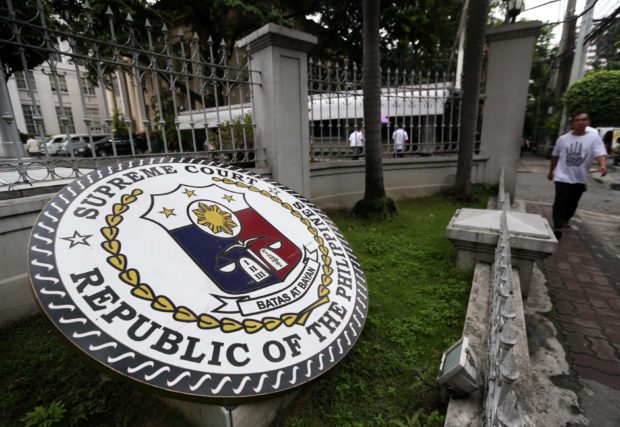PH’s 2005 joint exploration deal with China, Vietnam unconstitutional, says SC

FILE PHOTO: The Supreme Court logo. (INQUIRER/LYN RILLON)
MANILA, Philippines – The Supreme Court on Tuesday declared the country’s 2005 Tripartite Agreement for Joint Marine Seismic Undertaking (JMSU) with China and Vietnam unconstitutional.
Voting 12-2-1, which took 14 years, the SC said the JSMU violated the Constitution for allowing wholly-owned foreign corporations to explore the country’s natural resources without observing the safeguards provided in Section 2, Article XII of the 1987 Constitution.
The JMSU was signed in 2005 between China’s National Offshore Oil Corporation (CNOOC), Vietnam’s Oil and Gas Corporation (PETROVIETNAM), and the Philippine National Oil Company (PNOC).
Under the undertaking, joint explorations will be conducted in the South China Sea, covering 142,886 square kilometers. The agreement covers six islands claimed and occupied by the Philippines in Spratly, such as Pag-Asa Island, Likas Island, Lawak Island, Kota Island, Patag Island, and Panata Island.
But, up to 80 percent of the JMSU site is within the Philippines’ 200-mile exclusive economic zone, prompting the filing of petitions seeking to declare the agreement unconstitutional.
Article continues after this advertisementRespondents, however, argued that Section 2, Article XII of the Constitution was inapplicable because it contemplates the exploration, development, and utilization (EDU) of natural resources while the JMSU only involves pre-exploration activities.
Article continues after this advertisementThe SC, through Associate Justice Samuel Gaerlan, said that the term “exploration” pertained to a search or discovery of something in both its ordinary or technical sense and ruled that the JMSU involves the exploration of the country‟s natural resources, particularly petroleum.
Citing the text of the fifth whereas clause of the JMSU, which states the Parties‟ “expressed desire to engage in a joint research of petroleum resource potential of a certain area of the South China Sea as a pre-exploration activity,” the Court said that it is clear that the JMSU was executed to determine if petroleum exists in the Agreement Area.
“That the Parties designated the joint research as a pre-exploration activity‟ is of no moment,” said the Court. “Such designation does not detract from the fact that the intent and aim of the agreement is to discover petroleum which is tantamount to exploration.”
Named respondents in the petition were then president Gloria Macapagal-Arroyo, her executive secretary Eduardo Ermita, her Foreign and Energy secretaries, the PNOC and the Philippine National Oil Company-Exploration Corporation.
Concurring with Justice Gaerlan include Chief Justice Alexander Gesmundo and ten other justices. Meanwhile, Associate Justices Amy Lazaro-Javier and Rodil Zalameda dissented while Associate Justice Ramon Paul Hernando was on leave.
RELATED STORIES:
Group seek SC ruling on legality of joint exploration deal inked by Arroyo admin, China
Bayan Muna to SC: Resolve 10-yr-old joint exploration deal in WPS